Kaitlan Collins Is in Her Prime
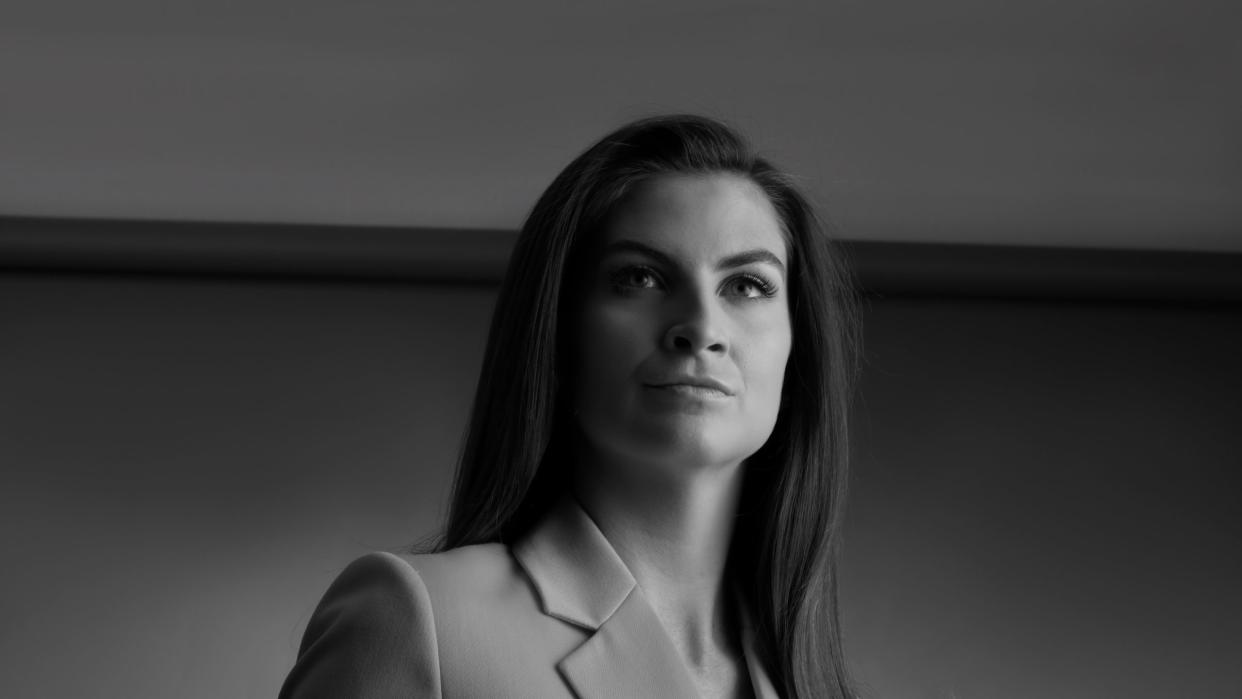

Kaitlan Collins approached her town hall with former president Donald Trump last May by applying the same formula that had cemented her status as one of TV’s most fearless reporters. She meticulously, almost obsessively, prepared. Then she prepared some more. Collins had interviewed Trump before, but this time the stakes were even higher. She would be asking him about his role in the January 6 insurrection. For nearly three weeks beforehand, Collins rewatched Trump’s old campaign debate footage and pored over past interviews. The more she dug in, the more she understood that she was in the middle of a pivotal moment in American history. “You realize the gravity,” she says.
If anyone understands the level of mental gymnastics that goes into a sit-down like that, it’s Collins. She landed in Washington after growing up in Alabama and, in just a fast few years, went from political blogger to White House correspondent to prime-time personality. Today, at age 31, she is one of the youngest anchors in CNN history, with loyal viewers tuning into her new show, The Source, every weeknight at 9 p.m. to watch her hold politicians to account.
Getting her picture taken, on the other hand, is a different story. In November, Collins arrived at our photo shoot initially a little bit nervous. She isn’t used to being the one put on the spot, but this is Collins we’re talking about, so she arrived in full glam, hair blown out, and with two power suits in tow—one bright pink and the other an olive green. She leaves nothing to chance. Whether it’s picking out suits or questioning political leaders like Trump, Collins approaches everything with intention, strategy, and anticipation. And she always does her research. “I definitely want to meet the moment, and make sure that I’m getting it right,” she says.
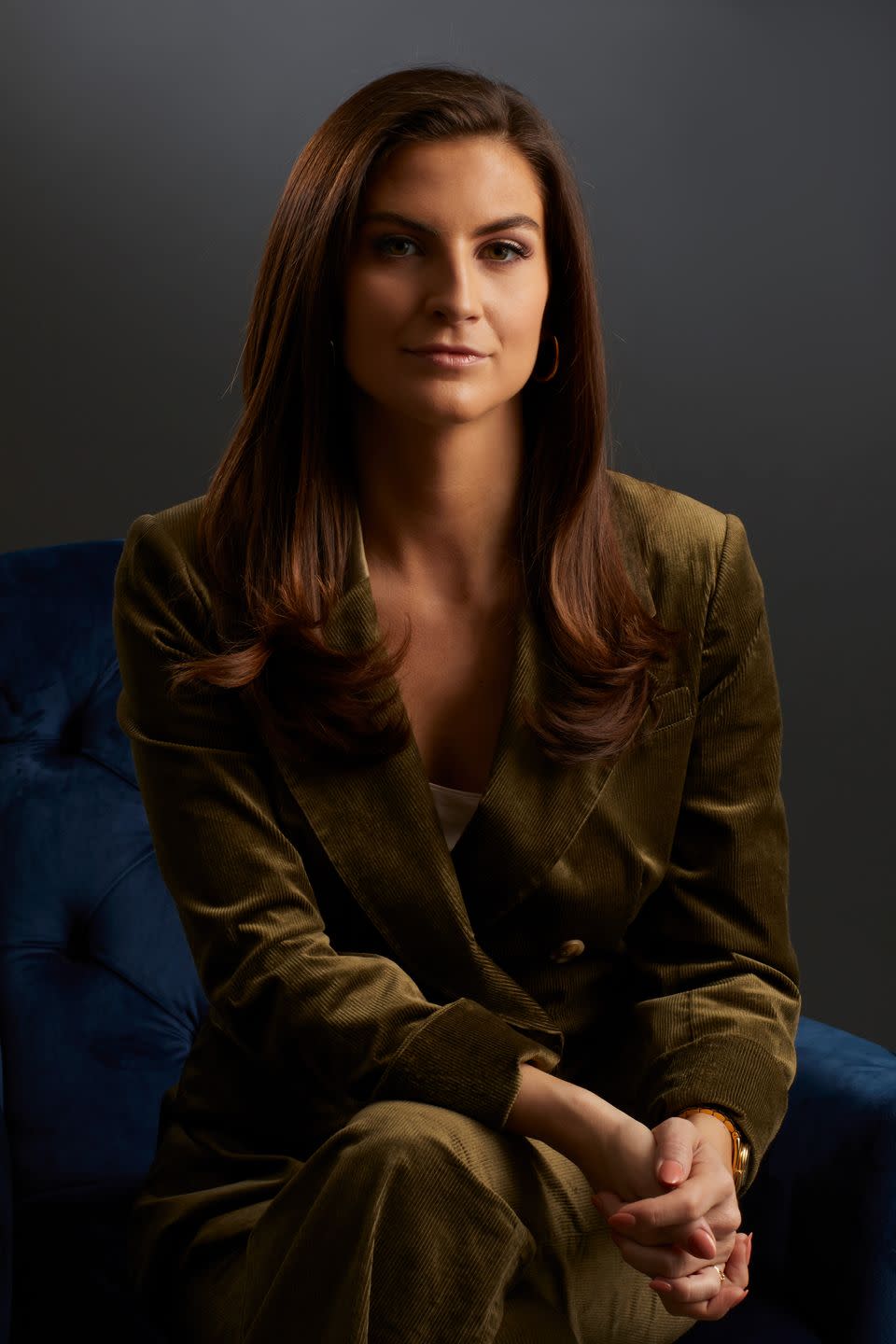
Her path to prime time started in Prattville, Alabama, a suburb of Montgomery, where she grew up with four siblings. From an early age, Collins had an insatiable curiosity about people: “I was never too timid or afraid to call someone I didn’t know or stop somebody on the street and introduce myself,” she says. After graduating from the University of Alabama in 2014 with degrees in political science and journalism, Collins moved to DC for an internship at The Daily Caller, a conservative news and opinion website cofounded by Tucker Carlson. “I didn’t even know what The Daily Caller was or who Tucker Carlson was,” Collins says. Several months later, she was promoted to staff entertainment reporter. It wasn’t exactly how Collins anticipated starting her career, but “I needed a job,” she says. Covering politics was still her goal, and living in DC, she says, was a kind of osmosis. “You’re around it so much. You see lawmakers at restaurants and at stores, and it just becomes your life.”
By 2016, Collins was promoted to the presidential campaign beat, blogging hundreds of articles about presidential candidates—including one who made a habit of standing out. “I was at a conservative-leaning outlet during the rise of Donald Trump,” she says. “We could see the [Republican] party transform from rejecting him…to embracing him.” Witnessing that in real time “made me a better reporter,” Collins adds. “It was very illuminating.”
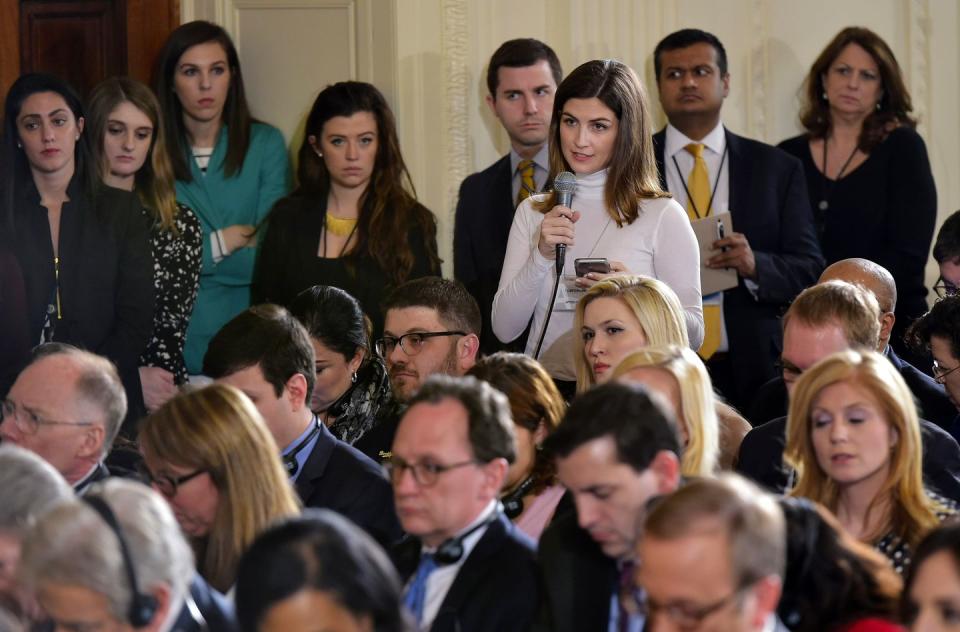
When Trump was elected, the new president’s unpredictability worked to the then 24-year-old’s advantage. “He leveled the playing field,” Collins says. “His presidency was so erratic, unlike those before him, that all reporters approached it from the same starting point.” In January 2017, she became The Daily Caller’s White House correspondent and suddenly found herself working alongside seasoned political reporters with decades of experience. “Every night I would go home and study and read so much, because I wanted to belong and feel like I deserved to be in the Briefing Room,” she remembers. The Daily Caller didn’t actually have a designated seat in the White House Briefing Room, but Collins showed up anyway. “The room was packed, and I’d have to go three hours before and sit in a seat, hoping that the person who was supposed to sit in that seat didn’t show up,” she says. “I would just sit there and work on my questions and think about what I was going to ask.”
Because she was with The Daily Caller, there was an assumption that Collins would ask softball questions, she says. “I didn’t,” she says with a laugh. “I asked really tough questions of Sean Spicer, and I think he would probably agree.” (Spicer did not respond to ELLE’s request for comment.) Other journalists in the room, like New York Times senior political correspondent Maggie Haberman, took note of the tough-minded reporter. “Kaitlan distinguished herself through good reporting and rigorous questioning in the White House Briefing Room,” Haberman says. “Good work stands out.”
By the time Collins turned 25, CNN producers also noticed her no-nonsense interviewing style. She made on-air appearances with then anchors Don Lemon and Brian Stelter. In April 2017, she had an unplanned chat with then CNN president Jeff Zucker at the network’s annual Sunday brunch, held on the weekend of the White House Correspondents’ dinner. It helped seal the deal. “I wasn’t angling for a job, but a few months later, I became part of the White House team,” she says.
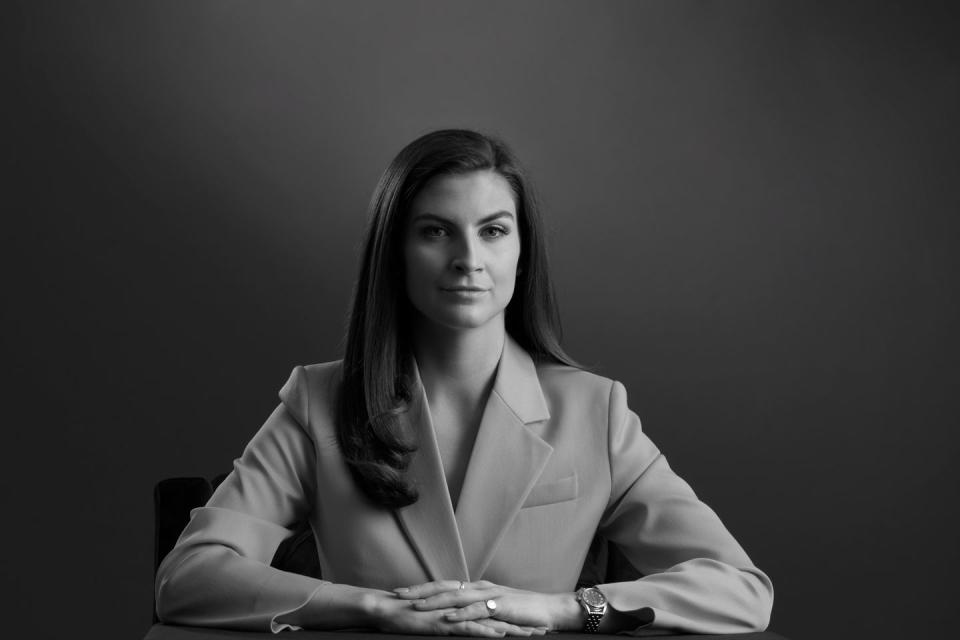
Collins approached her new job with a sharpened skill set that, in retrospect, she feels was lacking during her Daily Caller days. “I worked really hard so that I could properly and easily explain things to people who had five minutes to turn the news on,” she says. “I definitely had not done that previously. I saw a maturity and a thoughtfulness [in myself] and was much more intentional with my reporting.” She quickly became a member of the White House press corps, flying to Singapore for Trump’s meeting with North Korea Supreme Leader Kim Jong-un, and to Helsinki for his sit-down with Russian president Vladimir Putin. She was even at the White House the night Trump got COVID.
It was a make-or-break period in her career, at a time when Trump was must-see TV and the interlocutors around him were newsmakers in their own right. “If I missed a moment in an interview where I didn’t follow up about something, [I’d kick] myself later about it,” she says. “Sometimes you’ll have an interview and you’re like, ‘Okay, that was good. I covered all the ground that I wanted to cover.’ Other times, you think of a good follow-up as you’re going to sleep that night and it’s like, ‘Dammit.’” Reporting is a “constantly evolving process of perfecting your craft and making sure that you’re getting better every day,” she says.

It was official: Collins had crossed over to the other side of the political media landscape. But then, one day in July 2018, she abruptly found herself at the center of an incident that both secured her status among veteran DC reporters and brought together some members of both political sides of the press. Collins was the sole representative of network television chosen that day to cover President Trump at a White House event. She fired off a series of questions about his relationship with his former longtime lawyer Michael Cohen, and an invitation he extended to Russian president Vladimir Putin to come to the White House. President Trump refused to address them. “I left the Oval Office thinking nothing of it,” Collins says. “I did my job. He chose not answer. That was his prerogative.”
A little while later, Collins was called to then White House Press Secretary Sarah Huckabee Sanders’s office. Bill Shine, the White House communications director at the time, was also there. “They told me—and part of the conversation is off the record so I won’t share that part—but they essentially said that because of the questions I had asked and the tone I had used when I asked them, I wasn’t going to be allowed to go to the Rose Garden event that afternoon, which is insane,” she says. “You can’t bar a reporter from an open press event just because you don’t like the questions being asked. That’s not how things work. It’s the antithesis to an open and free press.” Several members of Fox News issued statements expressing solidarity with CNN. “They understood how wrong that was,” she says. “It was a moment of real press unity, because you can’t let the people you’re covering divide and conquer you. It was an important moment.”

Two years and another presidential election later, CNN promoted Collins to chief White House correspondent to cover the incoming Biden administration. In October 2022, she relocated from DC to New York City for a seven-month stint cohosting CNN This Morning with Poppy Harlow and Don Lemon, before getting her own prime-time slot. All roads led to this past May, when Collins sat down for a town hall with Trump, his first appearance on the network since the 2016 election.
Collins walked confidently onto the stage at Saint Anselm College in New Hampshire, with no visible sign of nerves, while 3.4 million viewers tuned in. She knew the interview could cause a stir, but she didn’t predict the visceral reaction—the good and the bad—it would generate all across the country. Some news outlets condemned CNN for letting Trump on a stage, with one even calling it a “disaster.” Other critics said the interview gave him license to spew more lies about the 2020 election results. On social media, some sexual assault survivors questioned giving the former president a platform when, just one day earlier, he was found liable for sexually abusing and defaming a writer.
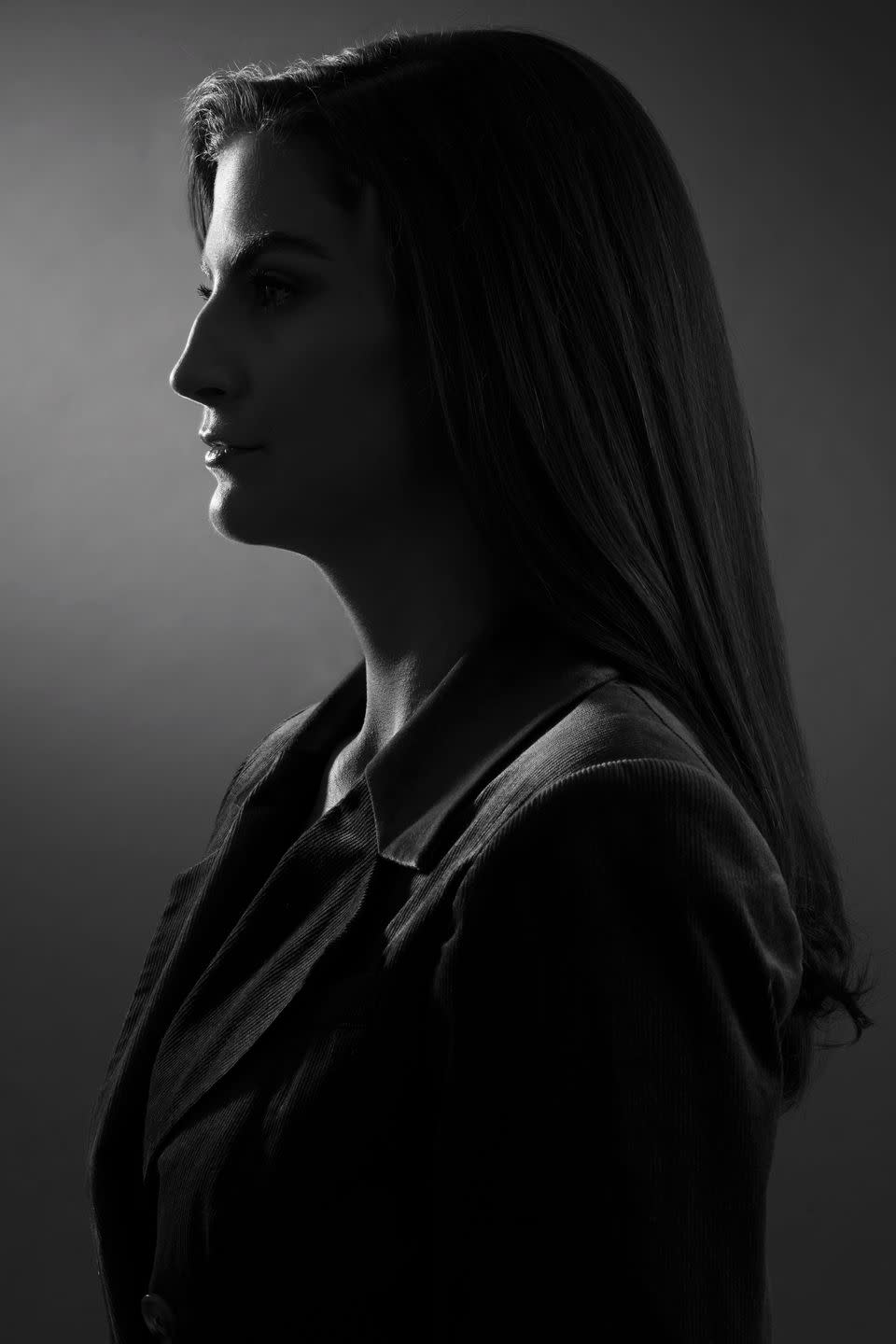
Collins has no regrets. “It’s not like he wouldn’t be covered if CNN hadn’t done that town hall,” she points out. “It’s not like he wouldn’t have airtime.” Over the years, she has learned that reporting on Trump is an always-debated, ever-evolving process. “It’s a conversation that we need to have on a constant basis,” she says. “I don’t think you can ignore someone who is the Republican front-runner, and likely if it was tomorrow, the GOP nominee.”
Whatever the reaction to the town hall, Collins was still on the rise. In July, several weeks after the fallout, CNN announced she would be anchoring her own prime-time show, The Source. Veteran network anchor Wolf Blitzer, host of The Situation Room, believes people feel comfortable opening up to Collins because “she treats everyone with respect,” he says. As if on cue, Blitzer zeroes in on the reason Collins has been able to get to where she is: “She does her research.”
Barely one month after taking command of The Source, Collins landed a bombshell interview with former attorney general William Barr. And just two weeks before Hamas terrorists launched an unprecedented surprise attack on Israel, she sat down with Israeli prime minister Benjamin Netanyahu. “There’s a lot that goes into an interview like that,” she says. But Collins did her homework. The goal was to hit on issues that the Israeli press, who did not have the same access, might need to know. “He wasn’t doing interviews in Israel. I wanted to make sure I held him to account,” she says.
Even though Collins helms an anchor desk, she still travels around the country and the world covering today’s most pressing events. This fall, she conducted her show from Israel after the October 7 attacks so she could meet with and report firsthand on the families affected by the war. As with her town hall with Trump, Collins recognizes the gravitas of the moment. It is “one of the most challenging stories to cover, but also one of the most important,” she says a few days after returning to the U.S. “It underscores what our roles as journalists are.”
Like the rest of the world, she remains consumed by what is happening in the Middle East. “Sometimes I cover these stories, and then I’ve gone out to dinner with friends and they have no idea what I’ve been covering,” she says. “This is so different in the sense that it has touched everybody. It’s been difficult to cover and to talk to these people who are going through the most traumatic experiences, things no one should have to go through.”
Through it all, both the breaking news stories and her summit meetings with power brokers, Collins has refined her reporting style over the past decade—something the cameras have caught happening in real time. “I’m so careful and prepared when I go on air now,” she says. “I make sure I know exactly what I’m talking about, because I know the responsibility and the weight that it carries.”
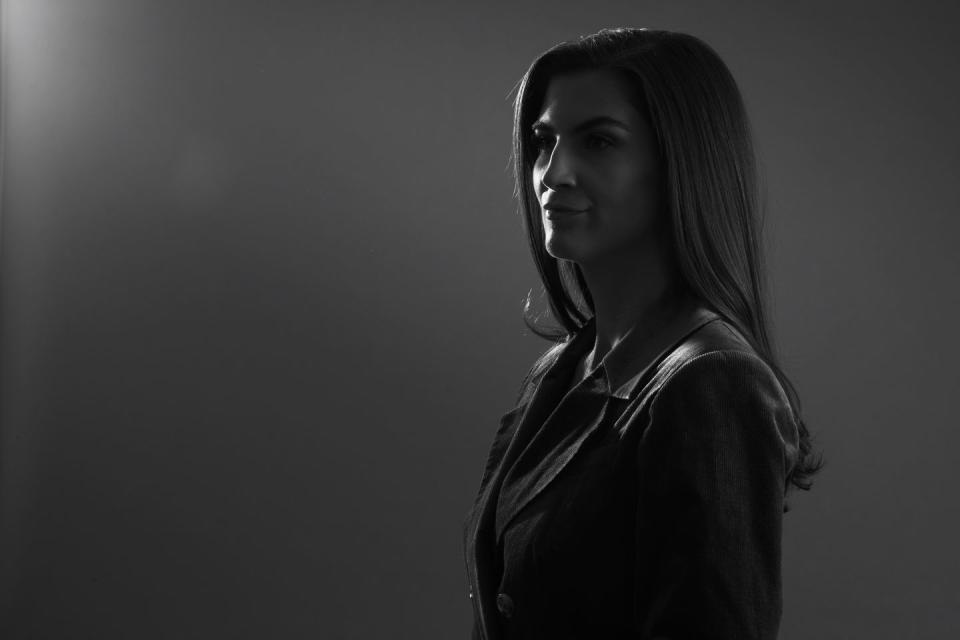
She has spent years perfecting the art of preparation, but Collins has also learned the value of adjusting her process once in a while. “Part of being a good interviewer is letting [the interview] take you wherever it wants to go and not having a set, rigid path of what you’re definitely going to talk about,” she says. “It’s also about calling out bullshit when there’s bullshit or calling out talking points when there are talking points. It’s your job to push those people, particularly when they’re world leaders.” As someone who’s been watching her for ages, interviewing the interviewer is, well, intimidating. But Collins laughs it off. “Unless you’re a lawmaker, I’m pretty harmless.”
With additional reporting by Yousra Attia.
You Might Also Like


